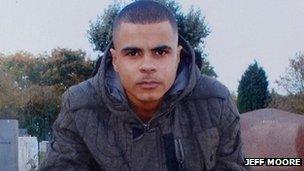Duggan family's 'breakdown in confidence' in IPCC
- Published

Mark Duggan's death in Tottenham sparked the first rioting of the summer
The family of Mark Duggan has suffered a "complete breakdown in confidence" in the police watchdog, a pre-inquest review has heard.
Michael Mansfield QC, for the Duggan family, said "from the beginning there has been misinformation, a lack of information" from the Independent Police Complaints Commission (IPCC).
Mr Duggan, 29, was killed by armed officers in north London on 4 August.
The IPCC admitted making a "mistake" by saying Mr Duggan had fired at officers.
No fingerprints
Anger over the shooting sparked riots in Tottenham on 6 August, with the unrest spreading across London and to other parts of England.
Mr Mansfield, who is also representing Mr Duggan's fiancée Semone Wilson, questioned Colin Sparrow, the lead investigator for the IPCC, during the hearing at North London Coroner's Court in High Barnet.
He said: "My first question is, you appreciate the anxiety that the family have about the investigation?
"And you are aware at least, one of the reasons is the misinformation that was broadcast at the beginning, close to the time Mark Duggan met his death.
"Misinformation suggesting some form of shoot-out, and you accept that was a serious mistake?"
Mr Sparrow replied: "It wasn't accurate", before adding: "It was a mistake."
Mr Mansfield continued: "The problem for the family is a complete breakdown in confidence for this investigation.
"While normally this question might not have to be asked because confidence is automatic, on this occasion, from the beginning, there has been misinformation, a lack of information, and conflicting information."
Weapon 'thrown'
When questioned, Mr Sparrow agreed there were no fingerprints, DNA or blood relating to Mr Duggan on the non-police firearm found at the scene.
The court was told that a gun initially linked to Mr Duggan was actually found 14ft (4m) away from the crime scene in Ferry Lane, and on the other side of a fence.
Mr Mansfield said witnesses had said they had seen a police officer throw the weapon there.
He asked Mr Sparrow: "How on earth did the gun get over a fence 14ft away? Was it thrown there by a police officer?"
Mr Sparrow replied: "That's a suggestion, yes."
The barrister asked Mr Sparrow to explain why the pathologist's interim report was not made available to the family, who were also not told about the trajectory of the fatal bullet which would have clarified the position of the officers and Mr Duggan.
The investigator for the IPCC, which has been granted interested-party status in the inquest, said the report contained only a cause of death and the family were told verbally.
Mr Mansfield also told the hearing the family requested that an independent pathologist carry out tests on Mr Duggan's body, and for them to be given the chance to discuss their findings with the original pathologist - but this had not been allowed.
Mr Duggan, a father-of-four, was a passenger in a minicab which was stopped in Tottenham by police as part of a planned operation. He died of a single gunshot wound to the chest.
Second bullet
Initially, police said Mr Duggan had shot at officers, a claim that ballistic tests proved to be untrue.
Mr Mansfield told the hearing that two types of blood had been found on the gun - but neither belonged to Mr Duggan.
After the hearing, the IPCC released a statement in which it said Home Office pathologist Dr Simon Poole also found a second bullet had struck Mr Duggan's upper right arm.
The watchdog said two police-issue bullets and two police-issue shell casings had been recovered from the shooting scene.
Forensic tests showed both bullets and shell casings were fired from a single CO19 officer's MP5 carbine, while a non-police-issue firearm was also recovered.
The IPCC said it now estimates the investigation will be completed in April 2012.
Meanwhile, the hearing was told the full inquest into Mr Duggan's death would last between four and eight weeks and aim to begin during the second week of September 2012.
- Published8 December 2011
- Published24 November 2011
- Published22 November 2011